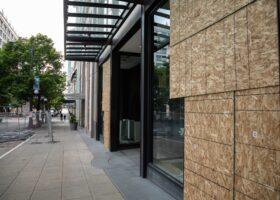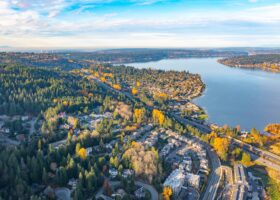Should the Sound Transit Board be elected by voters?
April 11, 2025
After the 18-member Sound Transit Board of Directors unanimously approved former King County Executive Dow Constantine at the end of March to become its new CEO (a move which will cost taxpayers more than $6 million), many residents have asked the questions, who is on the board and who are they accountable to?
Sound Transit’s taxing district is primarily the large population areas on the west side of King, Pierce, and Snohomish counties. At the time of the Constantine vote, the board consisted of the following appointed members:
King County (Appointed by King County Executive)
King County Executive Dow Constantine
King County Councilmember Claudia Balducci (Vice Chair of ST board)
King County Councilmember De’Sean Quinn
King County Councilmember Peter Von Reichbauer
King County Councilmember Girmay Zahilay
Auburn Mayor Nancy Backus
Redmond Mayor Angela Birney
Renton Councilmember Ed Prince
Seattle Mayor Bruce Harrell
Seattle Councilmember Dan Strauss
Pierce County (Appointed by Pierce County Executive)
Pierce County Executive Ryan Mello (Vice Chair of ST board)
Fife Mayor Kim Roscoe
Fircrest Councilmember Hunter George
Tacoma Councilmember Kristina Walker
Snohomish County (appointed by Snohomish County Executive)
Snohomish County Executive Dave Somers (Chair of ST Board)
Everett Mayor Cassie Franklin
Lynnwood Mayor Christine Frizzell
Washington State (appointed by Washington Governor)
Washington Secretary of Transportation Julie Meredith
It is obvious from looking at the board roster how undemocratic the board selection process has become. Nearly all Seattle residents have three of their elected officials (King Co. Exec. Seattle Mayor and a councilmember from either King Co. or City of Seattle) representing them on the board. Yet such populous communities as Shoreline, Edmonds, Puyallup, Sammamish, Issaquah, Bothell, Mukilteo, Lakewood, Woodinville, and Montlake Terrace are only represented by their county executives on the Sound Transit board. Despite this major discrepancy, all taxpayers must pay the same tax rates.
Since the current three county executives believe that larger governments and higher taxes are needed to solve problems in our region, they appoint individuals (who are confirmed by each county’s council) to the Sound Transit board who share these views. As a result. an overwhelming majority of board members hold the belief that government needs to be more fiscally responsible to the taxpayers.
This partially explains why Sound Transit’s current budget is more than 250% of what was promised to voters on the three ballot measures which approved the project:
- In 1996, voters approved $1.7 billion to build a line that ran from Lynnwood, through the U District and downtown Seattle and ending 1 mile north of SeaTac Airport.
- In 2008, voters approved $3.7 billion to construct a link from Bellevue and Redmond to the original rail line.
- In 2016, voters approved $53.8 billion to construct multiple lines/spurs that include Tacoma, Federal Way, Kent, West Seattle, Ballard, Issaquah, and Kirkland.
Regional voters approved a total of $59.2 billion in public funds, for Sound Transit, yet today, because of poor management, the total price is approaching $150 billion!
The board appointment method provides too much power to those who desire and financially benefit from large government with little or no oversight, while those who strongly believe in a smaller government with more public accountability have nearly no representation on the board.
This explains why the board often approves plans that have not been properly vetted, and massive, unexpected cost-overruns suddenly appear. Just last year, it was revealed that due actual construction costs being substantially higher than original planners predicted, the West Seattle line had gone from the $2.3 billion that was promised to the voters in 2016 to now costing as much as $7.1 billion – and they haven’t even begun serious construction.
Yet, because of the insular appointment process and the anonymity of the board’s work, not a single board member has ever been removed from this board nor their local office due to the massive cost overruns by Sound Transit.
This lack of public oversight and accountability has led some to call for direct elections of Sound Transit members. The taxpayers (and not a politician seeking to massively increase his taxpayer funded pension) would hire and fire board members.
This appears to be a plan worth exploring.
The pro-transit group Smarter Transit began a petition to ask the legislature to pass legislation which allows taxpayers to vote on who is on Sound Transit’s board. This would immediately impose much-needed accountability on the board.
It is time to stop the massive overspending at Sound Transit. Many people regret the lack of political courage during the 1970s and 1980s when the Washington Public Power Supply System (WPPSS, pronounced “whoops”) began to have runaway spending similar to what is currently occurring with Sound Transit.
Unfortunately, no one did anything to fix the problems until the power agency defaulted on bonds and the original $4.1 billion project ballooned to over $24 billion.
While cost overruns and delays are a regular occurrence for Sound Transit, we currently have the chance to fix the financial problems before it becomes another WPPSS. We can start to do this by simply having the board be accountable to taxpayers and not to politicians who can financially benefit from the publicly funded project.




